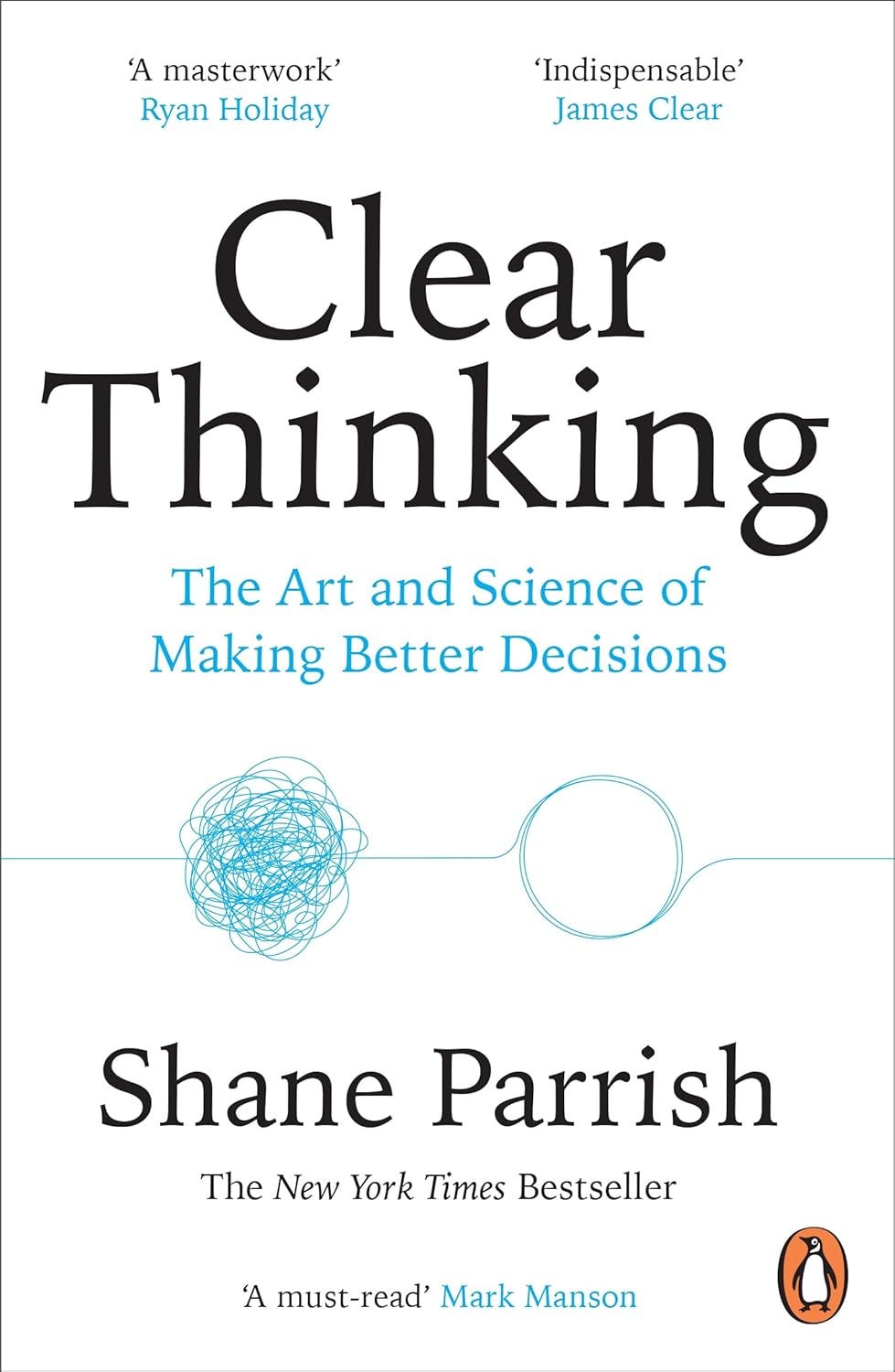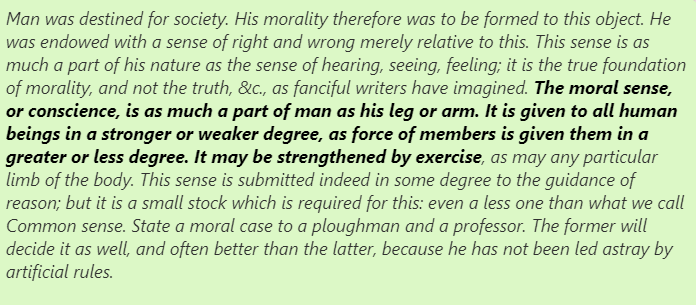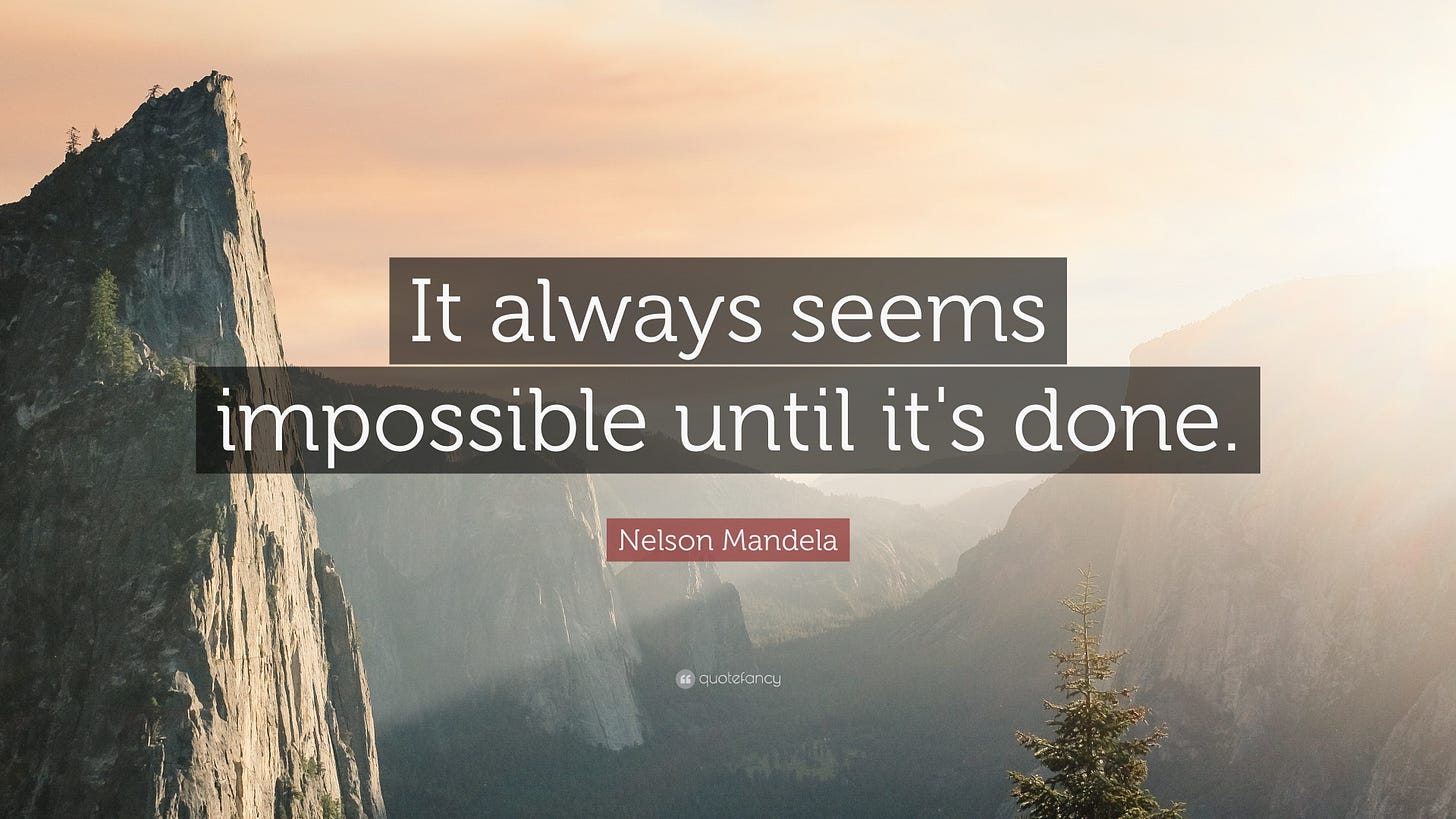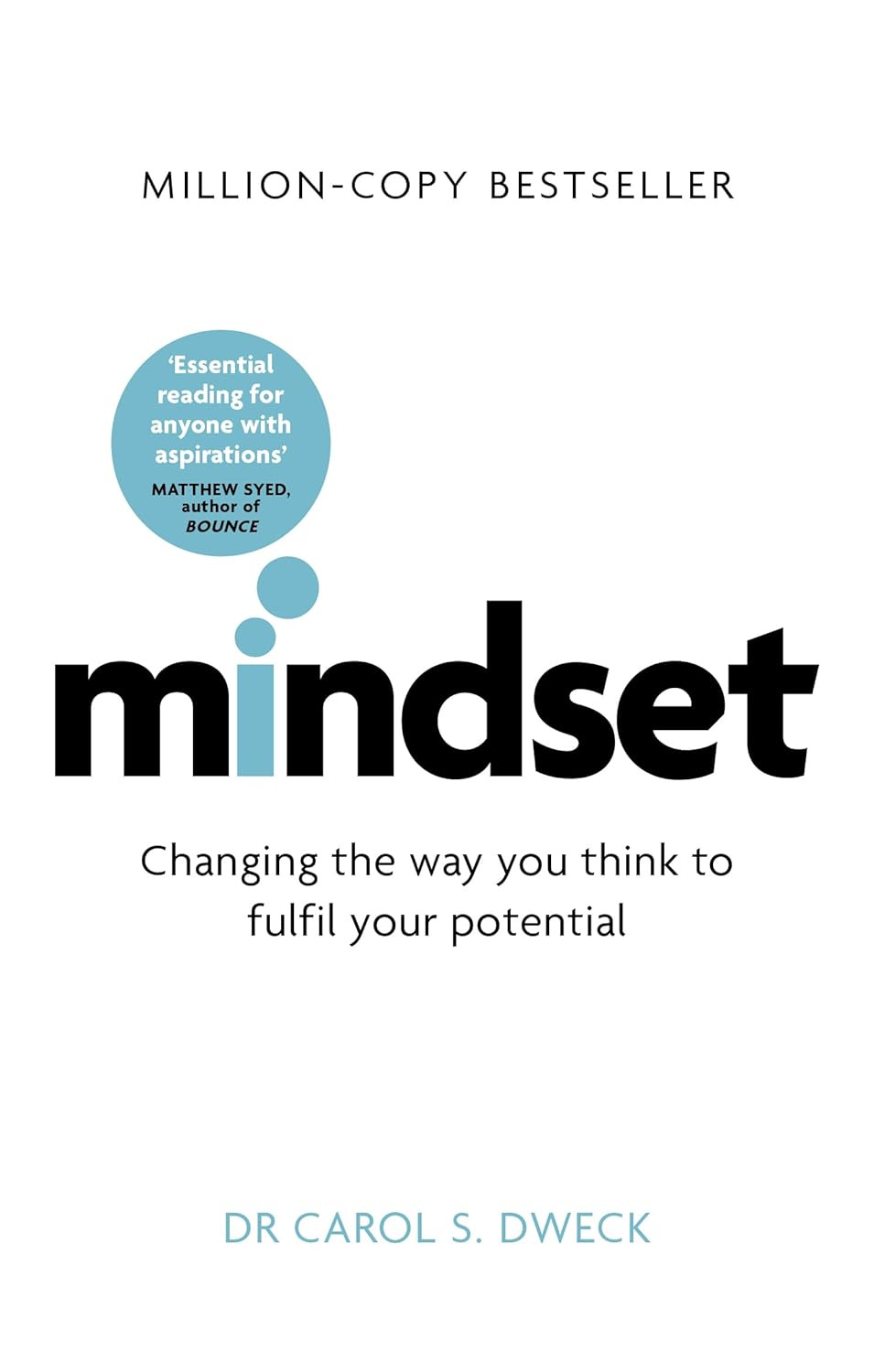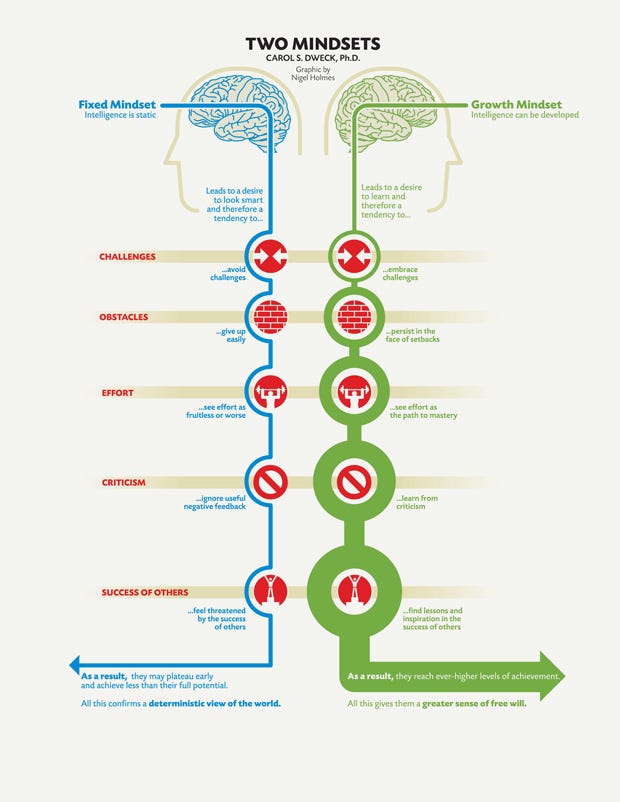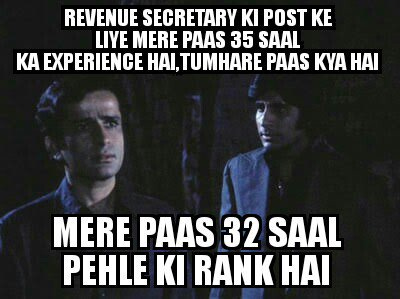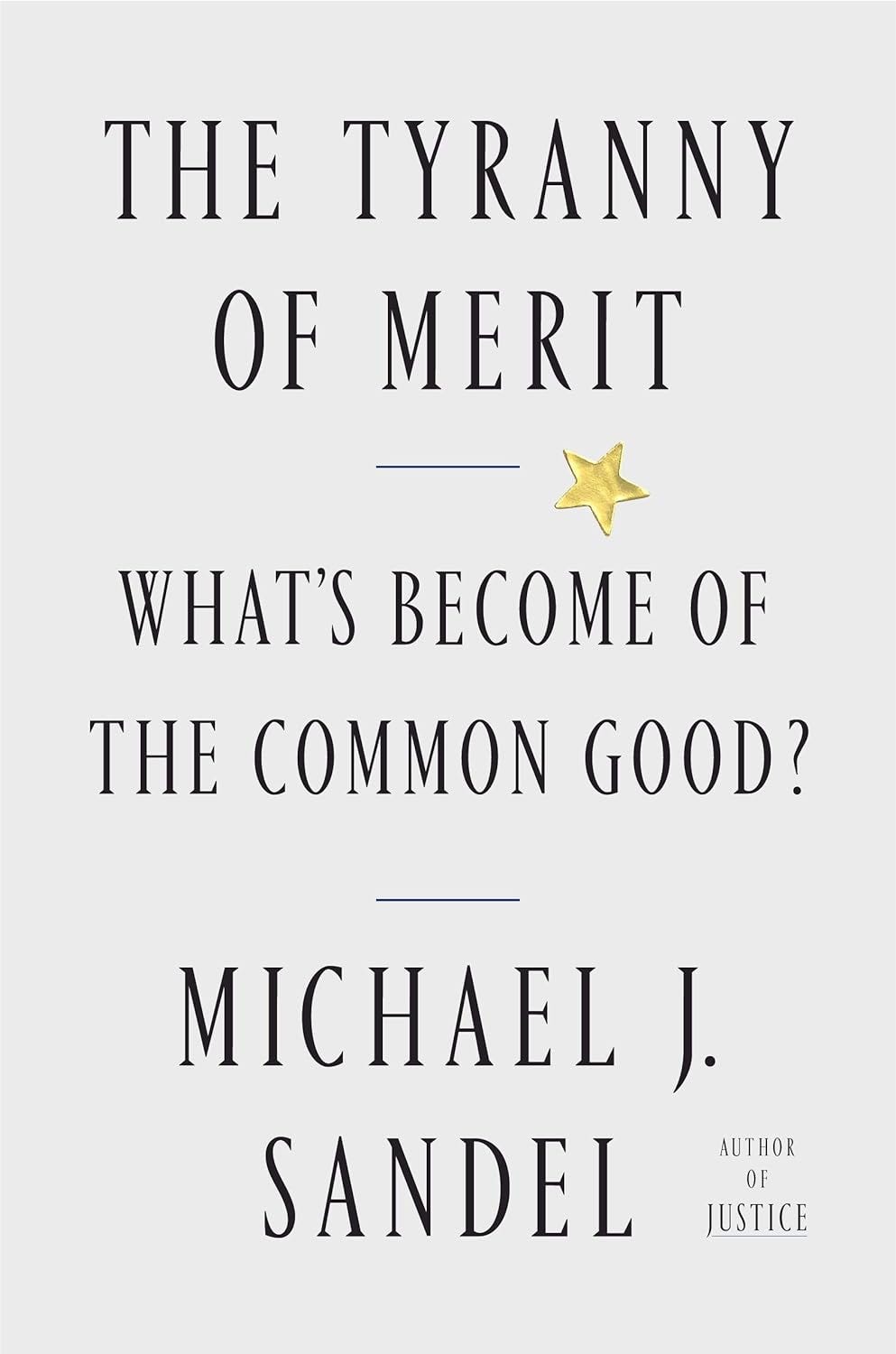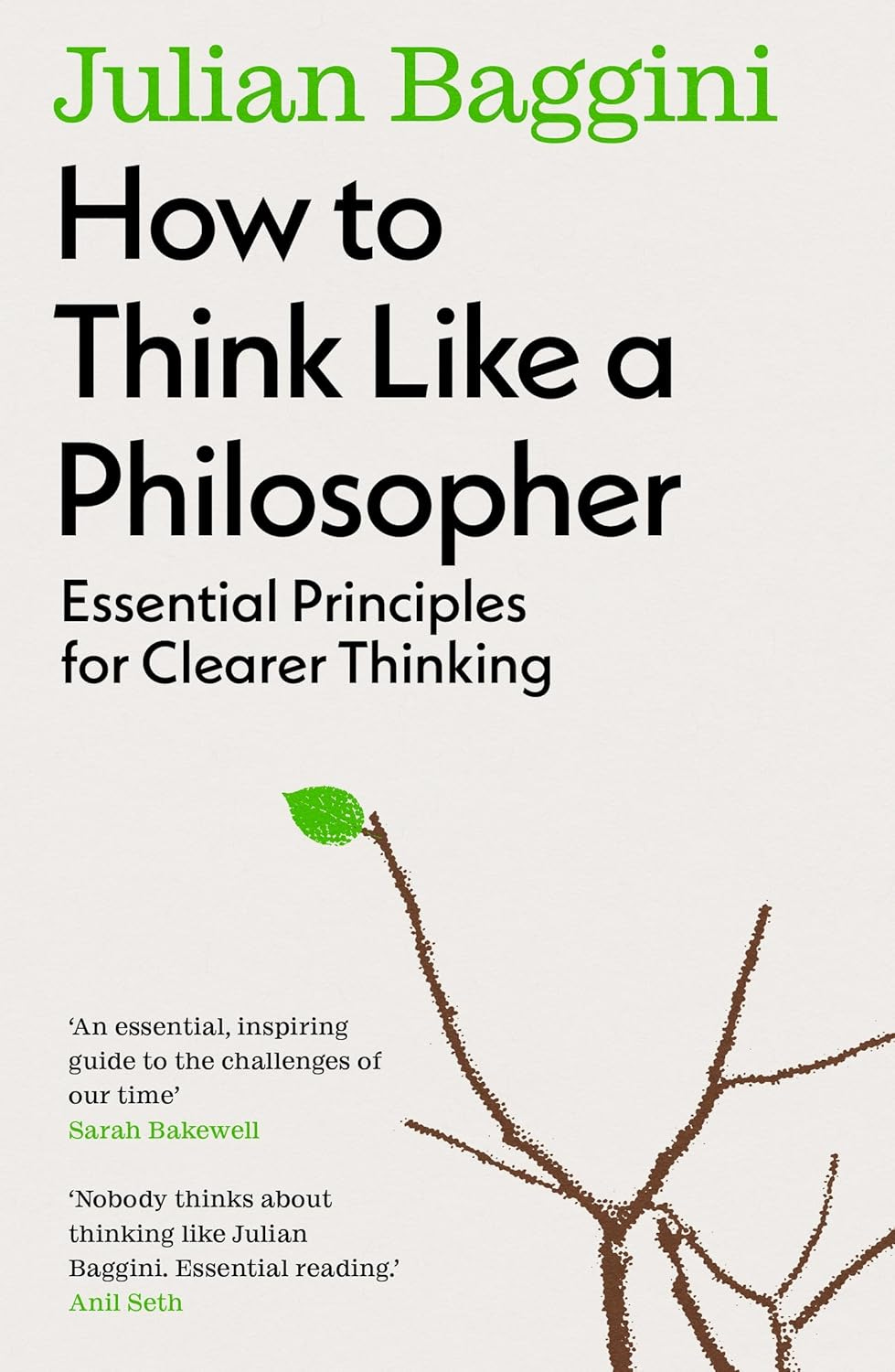#NotJust Yours or Mine
Reflections on Why Our Ethics and Morality is Not Just Our Own!, and How It Can, Does and Should Evolve
Hello Dear,
In the previous One Doubt Please article, we reflected upon some of the difficulties involved in any selection process which makes an evaluation of ethics. We explored this question in the context of the Civil Services Examination conducted by the Union Public Service Commission of India, in the hope that the lessons and insights learnt from the analysis are applicable more broadly, and #NotJust to the Civil Services Examination. You can read this article below.
#NotJust An Exam
Reflections on the Himalayan Challenge of Evaluating Ethics through An(y) Examination
And tell you what, one of my friends, incidentally a batchmate from another civil service, had read the above article and said that “it is very detailed and insightful, hope it inspires many”. 😊And yesterday morning, she messages me saying “someone read what you had written”. The reason? An article in yesterday’s Indian Express, where a former director of The Lal Bahadur Shastri National Academy of Administration (LBSNAA) is quoted as saying that the Ethics paper should be removed from the Civil Services Examination. 😊Of course, my friend was half-joking, and I too do not think or claim that this statement is in any way influenced by my article.
Be that as it may, let us continue our exploration of the question of ethics and its evaluation, in today’s article. My interest in this topic stems from my belief in the supreme importance of morality and ethics, of values, principles and beliefs.
Interestingly, just yesterday, I got the opportunity to take a session for my colleagues, on how the government could better leverage the potential of social media in improving the effectiveness of governance and development. And we were discussing the multidimensional and complex challenges which government departments have to tackle. One question which came up again and again in our discussions is this.
“When everyone else is doing this, what is wrong if we too do this?”
The question was not posed in this very manner, but yes, this is the doubt which some of my colleagues were asking, though in various forms and contexts. And in fact, this is what I had referred to in my session, as one of the many foundational challenges we are having to confront: the fact that the very ecosystem - the media and communication environment - in which we have to operate is polluted in many ways. In other words, to put it rather starkly:
“Say, you are an angel in Hell…can you on your own transform Hell into Heaven?”
I presented the challenges without offering any concrete solutions for them; in the hope that diagonising the problem, even when one is not able to offer any solution, is valuable in itself.
And yes, I shared my point of view with my colleagues, that our commitment to the principles and spirit of the constitution of India, disallows us from adopting unethical or questionable means, even if everyone else is adopting them. In particular, in the specific cases of government communication which we discussed, I pointed out how adopting the questionable means which most stakeholders in the ecosystem are adopting will violate the principles of truth, transparency and accountability, thus going against our democratic ethos.
This brings us, yet again, to a point we made in a recent One Doubt Please article: that the real decisions in life are those of ethics and morality. You can read this article below.
Yes, ethics pervades all of life, and yet, we do not seem to be giving ethics the attention it deserves. Listening to the experiences of two of my colleagues who were present in the session yesterday - both of them Indian Information Service (IIS) officers undergoing “On-the-Job Training” - makes me think that questions of ethics need to be given greater attention in IIS training as well. In fact, #NotJust during the training. 😊
Well, that brings us back to our original question - the challenge of evaluating Ethics through an(y) examination. I expect today’s discussion to bring out some dimensions of the question which we did not or could not address at all or adequately in the previous article. And what makes this all the more interesting (at least for me😊) is that this exploration is likely to present some counterarguments to some of the points I myself had raised in the previous article, titled #NotJust An Exam. 😊 Fine then, let us get to it then.
The Role of Knowledge
In the previous article referred to above, we argued that:
Change is #NotJust about Knowledge.
Based on this argument, we concluded that knowledge of ethics is not enough to instill ethics. Thus raising doubts on the ability of an Ethics paper in the Civil Services Examination to instill ethics in civil service candidates.
Now, here are some doubts I have about this argument. OK, accepted, knowledge of ethics is not enough to instill ethics; but does that necessarily mean that knowledge does not help in any way at all? In other words:
Knowledge of ethics may not be sufficient to instill ethics. But just because it is not sufficient, does it mean that knowledge is not helpful at all?
The answer, clearly, is no. Insufficiency of knowledge does not mean that knowledge has no role in helping one imbibe ethical behaviour. At this stage, without considering further information, we have to be open to both possibilities: it may or may not be helpful.
Doesn’t Knowledge Help At All?
So, where does the answer lie? What does your intuition tell you? I would tend to think that knowledge could indeed be helpful. Please note that we are not saying that knowledge will be helpful in every case, or for every person, but that on balance, it could be helpful. This has got to be so, since how we respond to, apply and act on the knowledge we acquire, varies from person to person and from situation to situation. In fact, it is not just how we respond; there is variation even in whether we respond to it at all.
OK, if knowledge of ethics could help, how, how exactly could it be helpful in instilling a better sense of ethics?
First of all, I think it could lead to a sharpening of our ethical senses. What? Am I answering the question “how could knowledge instill a better sense of ethics?” with the answer “it could lead to sharper ethical senses”? Is it a play of words, a circular or tautological argument? No, here is what I mean. Knowledge could lead to a heightened awareness of ethical principles and situations, an improved consciousness of the ethical dimensions of everyday life situations. In other words:
Knowledge of ethics could lead to a sharpening of our “ethical sense organs”, so to say.
And I believe this - our ethical consciousness - is a very important factor which influences the extent to which we are able and willing to hold on to ethical principles and values. A person who has internalized principles of ethics is more likely to consult them when he or she is confronted with a tricky situation. Such a person is likely to be more alert to the many dimensions of the choices in front of him or her. Someone who is less knowledgeable may not be able or inclined to even see some of these dimensions, which may reveal themselves, upon closer examination, to be ethical and moral dimensions.
Knowledge could bring about an improved awareness and ethical consciousness, which could help people to look beyond the obvious, and behold the oft-hidden ethical dimensions of diverse life situations.
Speaking about the oft-hidden ethical dimensions, I am happy and grateful to share with you what one of my colleagues told me after the session on social media I took today (about which we spoke earlier in this article). He said that the session “made us think about some of the non-obvious questions which we need to ask ourselves to be good at our jobs”. 😊 And it is my contention that knowledge can sort of help bring the submerged icebergs above the surface - meaning, it can help us pay better attention to what is not obvious, thus gifting us eyes to see the invisible.
[Wow! I am happy to share with you that this discussion just now led me to rediscover the concept of the knowledge iceberg. Here is an article on change and the knowledge iceberg, and here is a research paper titled “Emotional Knowledge: the Hidden Part of the Knowledge Iceberg”.]
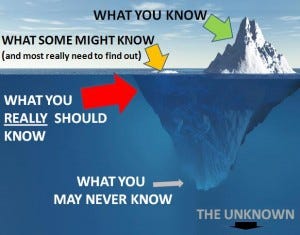
Speaking of the obvious and the non-obvious, here is a One Doubt Please article on this theme.
How Can Groups Better Encourage Ideas?
Reflections on the flow of ideas in groups, and some humble tips / ideas to inspire freer and fuller expression
So, by helping us become aware of and pay better attention to even the hidden ethical dimensions, knowledge could enable us to operate from a position of strength, rather than from a position of weakness. Here is what Shane Parrish says about the role of a good position in enabling us to think clearly and make the right decisions.
“Your position determines your future. The greatest aid to judgment is starting from a good position. We often think about making the best decision possible at the moment and forget about whether we are operating from a position of strength or weakness when the moment arises. Let me give you an example. One of my kids got a really poor grade on a test one day - as he handed it to me, he looked at me, shrugged his shoulders, and said, “I did my best.” What he meant was when the test was in front of him (form 10-11), he focused on the questions and answered them to the best of his ability. What he didn’t understand is doing your best is often about the position you put yourself in before you take the test. Putting yourself in a good position for the test means sleeping well, eating a healthy breakfast, and, of course, studying in the days leading up to the test. All the things you control. He hadn’t done any of that. And by not doing the thing in his control, he put himself in a worse position. It’s like he chose to play life on hard mode. And we do the same thing … we put ourselves in poor positions when we don’t exercise, we don’t sleep, we don’t invest in our relationship with our partners, we don’t anticipate, when we take on too much debt, and countless other ways. It’s hard to appreciate that over the long term, the average person who constantly puts themselves in a good position beats the genius who finds themselves in a poor position. A good position allows you to think clearly rather than be forced by circumstances into a decision. One reason the best in the world make consistently good decisions is they rarely find themselves forced into a decision by circumstances. They almost always operate from a position of strength.” - Shane Parrish, on Twitter
This insight is from his 2023 book titled “Clear Thinking”.
So yes, often, we end up doing wrong things, not because we want to do wrong, not even because we do not mind being and doing wrong, but simply because we did not know that we were doing wrong and thus being and becoming wrong. What say? Don’t you agree that ignorance is one of the foundational reasons for the evils in the world inside and around us?
Yes, it is one of our classic mistakes to assume or presume that evil has its origins in ill will. It is this error which Hanlon’s razor cautions us against. Quoting Shane Parrish again, here is what he says on Farnam Street:
‘Never attribute to malice that which can be adequately explained by neglect.’
So, as Hanlon’s razor implies, it could be that:
Part of the reason for a departure from ethical principles might be nothing other than the lack of a proper understanding and awareness of what these principles are.
Well, is it really so? One of the Founding Fathers of the United States of America seems to be offering a counter to our argument that a lack of awareness of ethical principles may be one of the causes for our failures to abide by them.
The moral sense, or conscience, is as much a part of man as his leg or arm. It is given to all human beings in a stronger or weaker degree, as force of members is given them in a greater or less degree. It may be strengthened by exercise - Thomas Jefferson
We had discussed the above point in the following One Doubt Please article.
#NotJust Leaders: Is(n't) Everyone of us called to Lead?
Reflections on the concept and practice of "leadership", especially the role of values and the fundamental role of leaders and leadership
I think Jefferson’s firm assertion, if true, gives us reason for a lot of hope. It means that the basic moral sense is embedded in every human being, irrespective of his or her training, education, knowedge or even life experiences. Jefferson’s statement implies also that knowledge and education should not have any significant role in instilling ethics and morality. Since hey, it is there already, in reasonably significant measure.
The Importance of Situation-Specific Ethical Knowledge
However, I think there is reason to believe that knowledge could play an important role, that it could be helpful, in instilling ethics. Why do I think so? Because…
Our ability to follow ethical principles is dependent #NotJust on a general knowledge of ethical principles. It depends also on how these principles are to be applied, in each of the increasingly complex and diverse life situations we encounter in modern society.
Yes, the first type of knowledge - a general knowledge and understanding of ethics, the moral sense, as Jefferson calls it - might very well be something which all of us are intrinsically and innately gifted with. However, in addition to this, don’t we also need the specific knowledge of how to apply our basic moral sense in each situation we are likely to encounter at work and more broadly, in life?
Come to think of it, could this not be the reason why we have a separate code of ethics for each industry or sector? For instance, we have a code of ethics for accountants, and another one for financial advisers. And we have another one for medical professionals, as well as the well-known Hippocratic oath. And we have one for journalists, by the Society of Professional Journalists. And speaking of the Indian Civil Service, we have the Civil Service Conduct Rules. And there could be a need for more such industry-specific and profession-specific codes and guidelines.
In fact, a lot of the ethical divergence and corruption in public life could very well be due to the absence of industry-specific codes of ethics which provide meaningful ethical guidance to the professionals of those industries or sectors or professions. There could be a need for these tailormade codes, rather than general principles or codes which are too broad and unspecific. Especially for professionals in the modern work society of the VUCA world , which is changing at breakneck speed, where disruption is the order of the day, where disciplines are fusing with each other and leading to new jobs and professions, the need for customized ethical codes might have become more than before.
Indeed, it could be that the particular situation-specific ethical knowledge is something which could be derived from the very same general ethical principles. But then, it is not advisable to leave every individual to himself to derive and figure out these specific principles, right? Such an approach would place on the individual very high demands of time, energy, motivation, and even knowledge, wisdom and judgement - something which is likely to be in short supply in many of the high-stress life situations we are likely to encounter. I hope you agree?
Is Our Ethical Quotient Fixed for Life?
There is a second reason why I believe that knowledge could help instill ethics, even if Jefferson’s statement regarding the basic moral sense is true. Interestingly, the answer can be found in Jefferson’s argument itself. We just need to examine the remainder of his statement, immediately following the lines quoted in the section above.
“In this branch therefore read good books because they will encourage as well as direct your feelings. The writings of Sterne particularly form the best course of morality that ever was written. Besides these read the books mentioned in the inclosed paper; and above all things lose no occasion of exercising your dispositions to be grateful, to be generous, to be charitable, to be humane, to be true, just, firm, orderly, couragious &c. Consider every act of this kind as an exercise which will strengthen your moral faculties, and increase your worth.” - Thomas Jefferson, From Thomas Jefferson to Peter Carr, with Enclosure, 10 August 1787
As we can see, the Founding Father does underline the importance of reading good books, in thus undertaking a “course of morality”.
The second part of the answer can be found in the point made by Jefferson in the previous quote. Where he says that the moral sense, or conscience, which is as much a part of man as his leg or arm, may be strengthened by exercise.
Yes, I think this is a very important point which often tends to get overlooked in a lot of our discourse and thinking. At a fundamental level, often, we tend to think that the goal of a selection process, especially a highly competitive selection process such as the Civil Services Examination, is to select people who possess certain enduring or fixed qualities or attributes. In other words, we unconsciously assume that the qualities based on which these people are selected will stay with the successful candidates for times to come.
And interestingly, a little reflection will make it clear to us that we are prone to applying this attitude not only to good or desirable qualities, but also to bad or dishonourable qualities. This can be seen in some of the simple statements and common utterances we hear or make ourselves in our daily conversations. Such as describing someone as corrupt. Well, do you think I am making too far-fetched an argument? I mean, if someone is indeed mired in corrupt deeds and is a habitual and hardened offender, is there anything inappropriate in referring to him or her as corrupt?
Perhaps not, but perhaps yes. The point I am driving at - something which we briefly made in the previous article too - is simply that we human beings are capable of change. And indeed, we do change in many ways as we proceed in life, don’t we? This means that we, who may be describing someone else as corrupt today, may become so tomorrow. Or maybe we were corrupt yesterday. Which would mean that we are nothing but corruptible. Probably like everyone else. We have explored this theme in the following One Doubt Please article.
#NotJust "The Corrupt": Are(n't) We All Corrupt?!
Reflections on the eternal malady of corruption; what it means to be corrupt, and how we could hope to combat it
And like us, everyone else too - irrespective of where one is today - should be capable of change, reformation and even the greatest goodness. Yes, it may be difficult; often, it is indeed very difficult, but hopefully, not impossible. As Madiba said:
“It always seems impossible until it is done” - Nelson Mandela
What do you say? What are your beliefs on this matter? We have reason to believe that the kind of view we adopt can have a profound influence on our life. That is what Carol Dweck tells us, in her 2012 book Mindset: The New Psychology of Success.
“For twenty years, my research has shown that the view you adopt for yourself profoundly affects the way you lead your life. It can determine whether you become the person you want to be and whether you accomplish the things you value. How does this happen? How can a simple belief have the power to transform your psychology and, as a result, your life?
Believing that your qualities are carved in stone — the fixed mindset — creates an urgency to prove yourself over and over. If you have only a certain amount of intelligence, a certain personality, and a certain moral character — well, then you’d better prove that you have a healthy dose of them. It simply wouldn’t do to look or feel deficient in these most basic characteristics.
[…]
There’s another mindset in which these traits are not simply a hand you’re dealt and have to live with, always trying to convince yourself and others that you have a royal flush when you’re secretly worried it’s a pair of tens. In this mindset, the hand you’re dealt is just the starting point for development. This growth mindset is based on the belief that your basic qualities are things you can cultivate through your efforts. Although people may differ in every which way — in their initial talents and aptitudes, interests, or temperaments — everyone can change and grow through application and experience.
Do people with this mindset believe that anyone can be anything, that anyone with proper motivation or education can become Einstein or Beethoven? No, but they believe that a person’s true potential is unknown (and unknowable); that it’s impossible to foresee what can be accomplished with years of passion, toil, and training.” - Carol Dweck
Like Dweck and Jefferson, the father of the Indian constitution, Dr. B. R. Ambedkar, too echoes a similar sentiment, on the need to cultivate constitutional morality - and the unstated belief that it can be cultivated.
“Constitutional morality is not a natural sentiment. It has to be cultivated. We must realise that our people have yet to learn it. Democracy in India is only a top-dressing on an Indian soil which is essentially undemocratic.” - Dr. Ambedkar.
So, what does your experience and intuition tell you? Do you think morality is something which can be cultivated, even after one has passed one’s formative years, “grown up” and entered adulthood and employable age? Or do you think that no, people can hardly change once their beliefs and values are formed in the early stages of childhood and youth?
Here is my “two cents” on this. My reflection and experience tells me that yes, people do and can change. And in both directions. For better and for worse. And quite interestingly, each one of us is likely to have undergone both types of changes over the years and decades. Isn’t it? We are - each one of us - likely to have become better or less bad in many ways, as well as less good or worse in many other ways. And in many other ways, the changes may not have an unambiguous value implication attached to it, in terms of being good or bad. Indeed, we would also have not changed and fundamentally stayed the same in many areas of our life. I think this highlights a need for periodic self-reflection and stock-taking, as to how our life is proceeding and how we are letting it proceed.
So, if we believe and accept that people do change and can change, it would demand that we lay much more emphasis on lifelong growth and continuous development of ourselves and our people, rather than only or primarily on one-time selection processes which are regarded as a ticket to lifelong glory, success and entitlements. This attitude of entitlement which is exhibited by many civil servants, has often been criticized, rightly so, to be a bane of the civil services.
We got the opportunity to witness a very interesting and unfortunate case in the year 2015, which was centred around this question. Of whether the one-time selection into the Indian Administrative Service (IAS) should confer upon IAS officers a lifelong privilege and superiority, including higher pay and faster promotions, over their fellow civil servants in other services. The trigger for “the war of words” between IAS officers and other civil servants was an apprehension among many IAS officers that the Seventh Central Pay Commission may restore the pay parity between IAS officers and other Group A civil servants.
More than 100 letters from IAS officers of different cadres and batches have been sent to the secretary of department of personnel and training in the last few days, just a few weeks before the seventh pay commission submits its report to the government….Another letter drew parallel to the recent world championships where Jamaican Usain Bolt won the 100 metres race by 0.01 second. “Can the silver medallist now claim that he should also be given a gold medal because he lost out so narrowly?” the letter questioned. - IAS officers get pay commission jitters, Mint, 30 October 2015
And here is what non-IAS officers had to say…
“Through Twitter hashtags like #parity4allservices and #IASnoUsainBolt, officers of non-IAS cadres are openly challenging the IAS officers’ arguments. Discussions are also on in many closed groups of these cadres on social networking site Facebook as well as on various blogs…Non-IAS cadres have said merit-based career progression and equality of opportunity should be the basis for growth rather than a one-time result in the civil services examination.” - Seventh Pay Commission: IAS, non-IAS officers spar over parity, Mint, 2 November, 2015
Here is an example of one such post by the IRS Association.
Questions of pay parity aside, what I find to be the most unfortunate about this debate is the very fact that this debate and fight happened in the first place. Or rather that a situation was allowed to be created, which provided adequate fuel for such a war of words.
For one, I wish civil servants who feel entitled for life based on their “success” at one examination at one point of their life read the arguments put forward by the philosopher Michael Sandel, in his 2020 book ‘The Tyranny of Merit’.
“For why do the successful owe anything to the less-advantaged members of society? The answer to this question depends on recognizing that, for all our striving, we are not self-made and self-sufficient; finding ourselves in a society that prizes our talents is our good fortune, not our due. A lively sense of the contingency of our lot can inspire a certain humility: "There, but for the grace of God, or the accident of birth, or the mystery of fate, go I." Such humility is the beginning of the way back from the harsh ethic of success that drives us apart. It points beyond the tyranny of merit toward a less rancorous, more generous public life.” - Michael Sandel
And this brings us to the next and possibly the last main point we will discuss today.
Is Our Ethics Ours Alone?
A fundamental trap all of us can fall into at various points of our life is to overestimate our importance, our contribution, our successes and our abilities. And to downplay our numerous shortfalls, weaknesses and failures, many of them invisible to us now and maybe forever. We could be overcome by our ego and forget to remember and appreciate how numerous other people and forces beyond our control or imagination have enabled us to be and become who we are today, to do what we regard as our accomplishments.
Interestingly, I think we are way too likely to make this error of the ego, while making judgements and evaluation of our ethical compass as well. It is far too easy to think that the only or major credit for our virtuous character should go to none other than we ourselves - to each one of us as individuals. Similarly, it is far too easy to fall into the trap of attributing all blame for someone’s misdeeds on that person alone, without pausing to consider the unique circumstances in which he or she was brought up or subjected to.
This is not to say that we are not responsible or that we need not be responsible for the choices we make. Rather, it is to acknowledge and appreciate that:
Our choices and our ethics and morality too are #NotJust ours alone, but also of the numerous groups in which we are embedded in at least from the time of our birth.
Here is what the philosopher Julian Baggini has to say about the shared nature of our knowledge.
“Knowledge is often thought of as something that we each individually have, something inside our own minds. But our knowledge depends on other people's testimony and expertise. And what we know depends on what our society makes it possible for us to know, either formally or informally through social norms and practices that suppress some ideas and privilege others.” - Julian Baggini, How Do We Know? The Social Dimension of Knowledge: Volume 89
In his 2023 book titled ‘How to Think Like a Philosopher: Essential Principles for Clearer Thinking’ (I am reading this now), Baggini speaks about the young field of Social Epistemology, the philosophical study of the social dimension of knowledge. He says that “this burgeoning field examines the previously under-appreciated role of communities, networks and other people in the formation of knowledge”.
And our contention is that this principle is applicable not just to knowledge, but to ethics and morality as well. I learn that this is what is known as “the social construction of morality”.
“Because modern individuals are social and not just natural creatures, they incorporate into the self a generalized sense of society by contemplating the effects of their actions on others, just as, in nearly everything they do, they assume that others will similarly incorporate into their actions the effects of living together. A sociological approach to moral obligation focuses neither on the individual standing outside of society nor on society as if it were not composed of individuals, but instead on the way individuals and society interact to make the moral order possible. The closest we can come to the notion of civil society as a living reality (without rejecting modern liberal democracy outright in favor of some older form of presumably moral community) is to recognize that it is only through the situations in which we come together with others that we develop the moral rules which make our interactions possible.” - Alan Wolfe, in his 1991 book Whose Keeper? Social Science and Moral Obligation
So, what is your experience and intuition regarding this? Do you agree that our ethics and morality are products of our environment as well, the people in our lives, the experiences which we go through, the systems and institutions in which we are embedded in? I think you would agree.
I for one cannot think otherwise. I believe my moral compass and ethical quotient has for sure evolved along with the journey of my life and career. Of course, the credit for whatever good I have within me is due to the love, wisdom, friendship, guidance and selfless advice of many dear ones and well-wishers, and people who have come into my life in one way or another. And I think it should be true for all of us. Of course, not everyone influences and not everyone influences in the same manner or degree. I think that is why it is important to have a good circle of close dear ones who know us well and can help and guide us through the vicissitudes of life. Speaking of careers, it is this idea which inspires the concept of a Personal Board of Directors.
So, coming now to the selection process and the Civil Services Examination, I would say that most selection processes suffer from the bias we have described above, of laying too much emphasis on the individual, and too less on people’s ability to relate with and collaborate with others, towards accomplishment of a larger goal which extends far beyond the self. True, many processes do emphasize interpersonal skills, leadership in teams, participation in extracurricular activities, community activities and the like. However, I think…
The more competitive the selection process becomes, the more difficult it becomes to evaluate one’s interpersonal attributes and people orientation.
What say? In this sense, I have been thinking that the very idea of competition - especially hyper-competition as exists in the civil services examination - as a criterion for advancement in life goes against the ethic of collaboration which the candidates who come out successful in the hyper-competition are supposed to be imbibed with. In fact, we want these candidates to be #NotJust imbibed with these qualities. We also want them to exhibit, and even promote and cultivate this ethic among the many people with whom they interact.
This is what inspired me to make the following submission in the inputs I provided in 2015 or so, to the then-head of the Training Academy for the Indian Information Service, as part of an exercise to review the civil services examination.
“A serious lacuna in the present selection system is that all stages of the selection process evaluate only individual performance, while one of the foremost qualities a civil servant requires is the ability to work together, to inspire and take people along. To this end, some processes that evaluate the affinity of the candidate to work in a group needs to be incorporated into the selection process.” - from my article, on Reviewing the Selection Process for India’s Steel Frame
So, we are #NotJust individuals. We are and are formed and moulded as part of groups, communities, society and other social institutions. Our journey is a collective journey, not an isolated one.
No man or woman is an island; nor is our morality, or our ethical consciousness.
As such, social institutions too have a very important role in influencing our behaviours. And it is important that we lay due emphasis on this, while planning, conducting and evaluating any selection process which evaluates ethics.
Along similar lines, here is a 2009 paper titled Philosophy and Public Policy: A Role for Social Moral Epistemology, by Allen Buchanan in the Journal of Applied Philosophy, where he makes the case for a more sophisticated conception of ethics which helps us guard against the subversions of morality, including those subversions which are facilitated by the processes of belief-formation which our social institutions and practices foster (I do not have access to the full paper, this is from the abstract alone😊).
Speaking of the civil services examination, this discussion brings us to an earlier One Doubt Please article, where we spoke of the role of “the system”, the environment in which the successful candidates are going to be embedded upon their selection.
#NotJust The Right Candidate
Reflections on why hiring the right candidates is not enough to improve the integrity of the Indian Civil Services
As we pointed out in the above article:
It is not enough to examine we hire the candidates with the right aspirations, the right skills and even the right attitude and the right character. What is at least equally or perhaps even more important is the environment - “the system” - in which we are immersing these civil servants.
The Need for Eternal Vigilance and Lifelong Learning
So, what do we take away from all these reflections? While I hope there are many takeaways😊, I would like to close with the reminder to myself and to you, that:
No one graduates from the University of Life.
And that:
Lifelong learning, reflection, recalibration and renewal are necessary #NotJust in the intellectual sphere, but also in the moral and ethical domains as well.
Before we close, here are two more questions. We started by asking whether knowledge of ethics could help instill ethics. Now, could it be that knowledge is #NotJust helpful, but even necessary for ethical and moral consiousness? While still not being sufficient?
At the same time, is it also possible that knowledge could stand in the way of ethical and moral sense and sensibility?
Fine then, let us close on this note. How did you find this article? Please do let me know, in the comments, or at Newdheep@gmail.com. And please consider sharing this article with your dear ones, in case you deem it fit. Thank you very much! 😊







